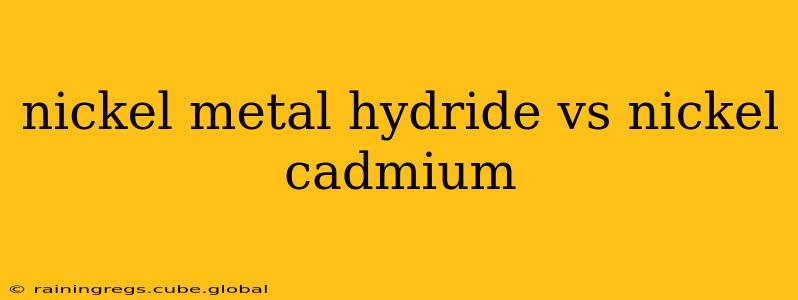Choosing the right rechargeable battery can be tricky, especially when faced with options like Nickel Metal Hydride (NiMH) and Nickel Cadmium (NiCd). Both have been popular choices for various applications, but understanding their differences is crucial for making an informed decision. This comprehensive guide delves into the key distinctions between NiMH and NiCd batteries, helping you determine which technology best suits your needs.
What are Nickel Metal Hydride (NiMH) Batteries?
NiMH batteries are a type of rechargeable battery that utilizes a nickel oxide hydroxide cathode and a hydrogen-absorbing alloy anode. They offer a higher energy density than NiCd batteries, meaning they can store more energy for their size and weight. This makes them a popular choice for portable electronics and power tools.
What are Nickel Cadmium (NiCd) Batteries?
NiCd batteries, an older technology, employ a nickel oxide hydroxide cathode and a cadmium anode. While they were once prevalent, their use has declined due to environmental concerns and performance limitations compared to NiMH.
NiMH vs. NiCd: Key Differences
Here's a breakdown of the key differences between NiMH and NiCd batteries, addressing common questions users have:
1. Energy Density:
- Which battery has a higher energy density? NiMH batteries boast a significantly higher energy density than NiCd batteries. This means you get more runtime for the same size and weight.
2. Environmental Impact:
-
Are NiCd batteries harmful to the environment? NiCd batteries contain cadmium, a toxic heavy metal. Their disposal requires special handling to prevent environmental contamination. NiMH batteries are considered more environmentally friendly.
-
Which battery is better for the environment? NiMH is the clear winner in terms of environmental impact due to the absence of toxic cadmium.
3. Memory Effect:
-
Do NiMH batteries suffer from the memory effect? The "memory effect," where a battery remembers its previous discharge level and limits its subsequent capacity, is far less pronounced in NiMH batteries compared to NiCd. While a minor effect can still occur under specific circumstances (repeatedly discharging to a very low level), it's not the significant problem it was with NiCd.
-
Do NiCd batteries have a memory effect? NiCd batteries were notoriously susceptible to the memory effect, requiring deep discharges periodically to maintain full capacity.
4. Self-Discharge Rate:
- Which battery self-discharges faster? NiMH batteries have a higher self-discharge rate than NiCd batteries. This means they lose charge more quickly when not in use.
5. Voltage:
- What is the voltage of NiMH and NiCd batteries? Both NiMH and NiCd batteries typically have a nominal voltage of 1.2 volts per cell.
6. Cost:
- Which battery is more expensive? Generally, NiMH batteries are slightly more expensive than NiCd batteries upfront. However, their longer lifespan and higher energy density can offset this initial cost difference over time.
7. Lifespan:
- Which battery lasts longer? Both NiMH and NiCd batteries have a respectable lifespan, but NiMH generally offers more charge cycles before significant capacity degradation occurs.
8. Charging Time:
- Which battery charges faster? Charging times are comparable for both battery types, though the specific time will vary based on the charger and battery capacity.
Conclusion: Choosing the Right Battery
The best choice between NiMH and NiCd depends on your specific needs. If environmental friendliness, higher energy density, and minimal memory effect are priorities, NiMH is the superior option. However, if cost is the paramount concern and the memory effect isn't a major issue, NiCd might be considered (though environmental concerns should be carefully weighed). Given the advancements in NiMH technology and its overall better performance and environmental profile, it is generally the recommended choice in most applications today.
